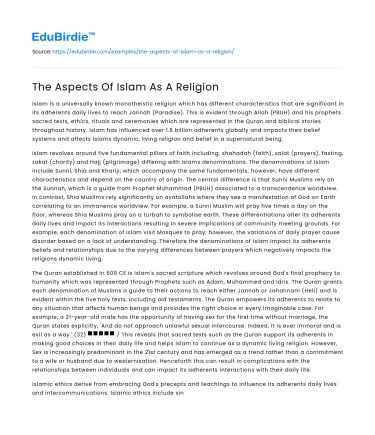Islam is a universally known monotheistic religion which has different characteristics that are significant in its adherents daily lives to reach Jannah (Paradise). This is evident through Allah (PBUH) and his prophets sacred texts, ethics, rituals and ceremonies which are represented in the Quran and biblical stories throughout history. Islam has influenced over 1.8 billion adherents globally and impacts their belief systems and affects Islams dynamic, living religion and belief in a supernatural being.
Islam revolves around five fundamental pillars of faith including, shahadah (faith), salat (prayers), fasting, zakat (charity) and Hajj (pilgrimage) differing with Islams denominations. The denominations of Islam include Sunni, Shia and Khariji, which accompany the same fundamentals; however, have different characteristics and depend on the country of origin. The central difference is that Sunni Muslims rely on the Sunnah, which is a guide from Prophet Muhammad (PBUH) associated to a transcendence worldview. In contrast, Shia Muslims rely significantly on ayatollahs where they see a manifestation of God on Earth correlating to an immanence worldview. For example, a Sunni Muslim will pray five times a day on the floor, whereas Shia Muslims pray on a turbah to symbolise earth. These differentiations alter its adherents daily lives and impact its interactions resulting in severe implications at community meeting grounds. For example, each denomination of Islam visit Mosques to pray; however, the variations of daily prayer cause disorder based on a lack of understanding. Therefore the denominations of Islam impact its adherents beliefs and relationships due to the varying differences between prayers which negatively impacts the religions dynamic living.
Save your time!
We can take care of your essay
- Proper editing and formatting
- Free revision, title page, and bibliography
- Flexible prices and money-back guarantee
The Quran established in 609 CE is Islam's sacred scripture which revolves around God's final prophecy to humanity which was represented through Prophets such as Adam, Muhammed and Idris. The Quran grants each denomination of Muslims a guide to their actions to reach either Jannah or Jahannam (Hell) and is evident within the five holy texts, including old testaments. The Quran empowers its adherents to relate to any situation that affects human beings and provides the right choice in every imaginable case. For example, a 21-year-old male has the opportunity of having sex for the first time without marriage, the Quran states explicitly, 'And do not approach unlawful sexual intercourse. Indeed, it is ever immoral and is evil as a way.' (32) اسراء / This reveals that sacred texts such as the Quran support its adherents in making good choices in their daily life and helps Islam to continue as a dynamic living religion. However, Sex is increasingly predominant in the 21st century and has emerged as a trend rather than a commitment to a wife or husband due to westernisation. Henceforth this can result in complications with the relationships between individuals and can impact its adherents interactions with their daily life.
Islamic ethics derive from embracing God's precepts and teachings to influence its adherents daily lives and intercommunications. Islamic ethics include sincerity, love and patience, much like any other religion; however, obligations are ethics that show in gender roles. For example, women have the responsibility of marrying and serving their husband, and this affects women as it does not reflect westernisation or women empowerment movements. This is evident in the United Arab Emirates where Islam is the primary religion and influenced the establishment of the Sharia law throughout aspects such as the legal system, education and gender roles based on Islamic ethics. In the past, the UAE would prevent women from accessing the workforce and education due to religious worldviews of women-only existing to create a family. This is evident in the Quran, 'Add to the numbers of your children, because I, on the Day of Judgment, will feel honoured about the greatness of your numbers over the other Ummahs'.' 139 Therefore, ethics play a vital role in developing an individual or countries faith; however, do not always apply to 21st Century values and can affect Islams dynamic living.
Islam has a series of rituals and ceremonies during different life stages which impacts the lives of its adherents and contribute to Islams dynamic living. An essential ritual for males includes circumcision as it reinforces submission to God and prevents infections. On the contrary, death is the most significant ritual in a person's path to God, and they have to be buried the day after the deceased has passed to ensure access to heaven. This is evident in the Hadith where Prophet Muhammed stated: 'Hasten the funeral rites.' In this occurrence, contact with the deceased body is limited, which restrains the grief to a minimum.
Additionally, Hajj is an important ritual where Pilgrimage to Mecca is necessary to reach Jannah, whereas Salat is a daily ritual that maintains the dynamic living of Islam. Ceremonies in Islam occur after rituals of significance, such as fasting. For example, after the month of fasting the celebration of Eid-ul-Fitr is celebrated by Muslims worldwide for their contribution to Allah (PBUH). Muslims worldwide engage in fasting to gain self-restraint. This is evident in, 'O you who believe! Fasting is prescribed to you as it was prescribed to those before you. so that you may learn self-restraint.' Allah (PBUH) The celebrations of Eid occur including, festivals, feasts, illuminated lights and markets that any member of society can engage with to celebrate Islam. This idea showcases that Islamic ceremonies such as Eid contribute to its dynamic living in society and are significant in maintaining an individual's access to heaven.
In conclusion, Islams monotheistic religion is universally declared with varying characteristics such as beliefs, ethics, rituals, sacred texts and ceremonies which depend on Islams denominations and contribute to a dynamic living religion.






 Stuck on your essay?
Stuck on your essay?

